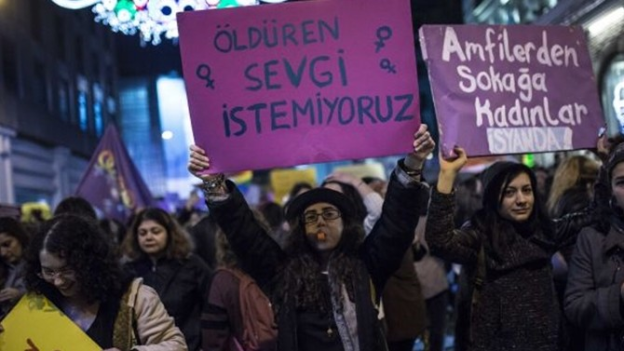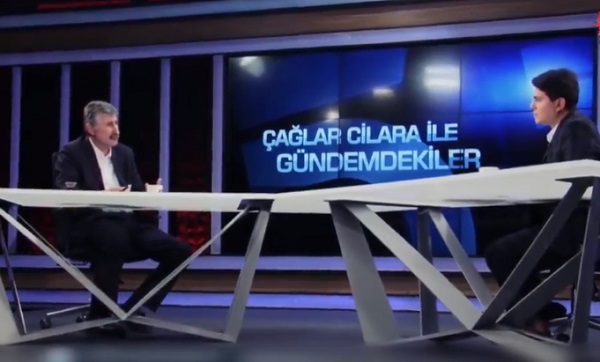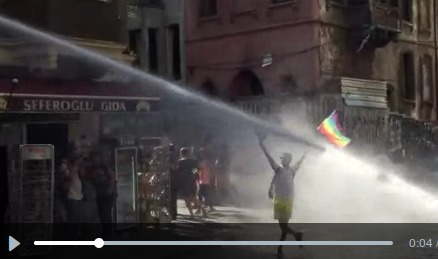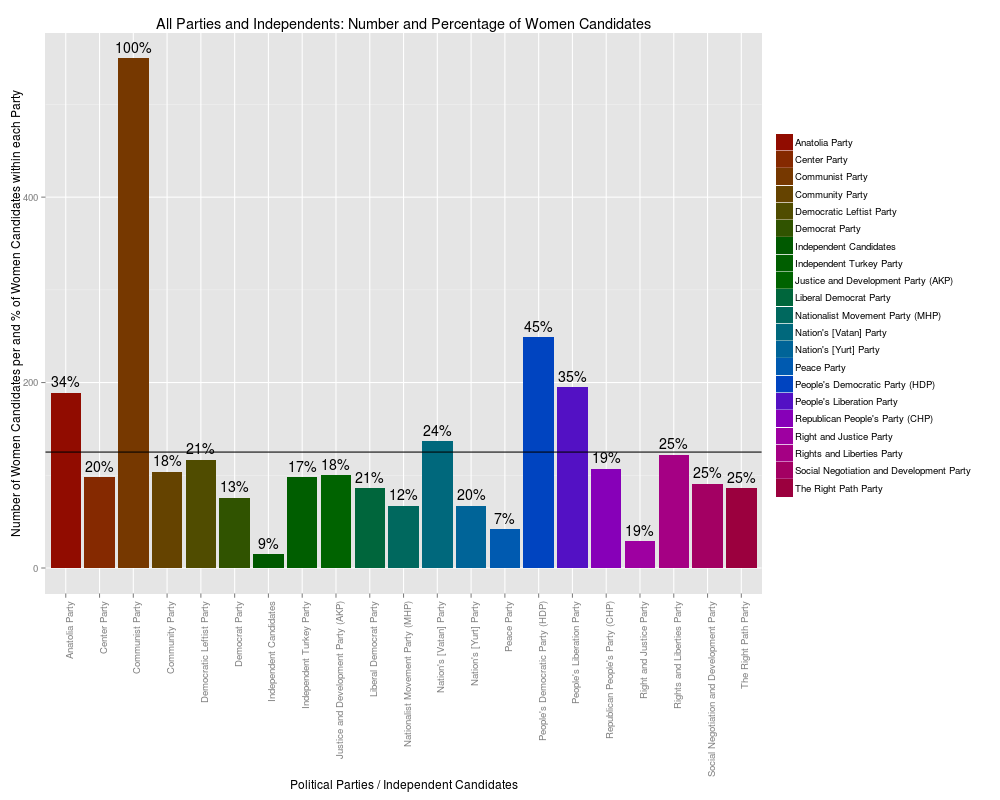One week before the [Turkish Constitutional] Referendum [on April 16], we spoke with Kıvılcım Arat, an activist for the “Women Who Say No” platform, in which feminist and LGBTI+ groups partner, and one of the founders of the Eylül Cansın Home for Trans folk (Eylül Cansın was a 23-year old trans woman who committed suicide in Jan. 2015). We spoke about the importance of this year’s International Women’s Day on March 8, the achievements of the “No” campaign in Turkey, and the indispensability of taking opposition into the streets.
Source: Zeynep Koçak, “Referanduma doğru kadınlar, feministler ve LGBTI+” http://p24blog.org/soylesiler/2118/referanduma-dogru-kadinlar–feministler-ve-lgbti- , P24, April 08, 2017
Women, Feminists, and LGBTI+ in the lead-up to the Referendum
Kıvılcım Arat: “When we look at who held their ground following the July 15 coup attempt, we see that it is women.”

Kıvılcım Arat is a graduate of Cumhuriyet University, where she studied Radio and Television Production. Since 2009, she has been working on sex workers’ and transgender rights. As an activist, she has taken an active role in organizing events for Trans PrideWeek, campaigns related to the Roşin Çiçek lawsuit, and many campaigns relating to hate crimes. She is currently on the executive board of the Istanbul LGBTI+ Solidarity Association and the current spokesperson for the Democratic Women’s Movement.
Let’s listen to Kıvılcım, why are we saying “No”?
In your opinion, how was March 8, the International Women’s day, this year? Do you see the night marches on İstiklal Avenue, the events at Bilgi University, or even the presence of a more defiant attitude towards the general pressures, as a call for rights? How do this year’s demonstrations compare to LGBTI+ and women’s marches of the past?
To answer this question, it is necessary to look at what happened on June 7 [parliamentary elections in 2015], and even more so what happened after the attempted coup on July 15 [2016]. Up until now, the Kurdish opposition in Turkey had the following characteristics: The opposition always held the streets, even if they lost ground or were pressured to leave. The opposition maintained their presence on the streets for control over policing, street surveillance, policy-making, and ultimately, the right to be there. However, after July 15, the palace-wielding AKP took a different direction: it mobilized its own masses and had them take over the streets in the name of democracy. It became clear to those who were watching that what happened on the Bosphorus Bridge served as a rehearsal for such a tactic. In the weeks following June 7, many marches that were organized to support democratic rights were blocked or delayed in some way. One of the most obvious examples of this was during Trans Pride Week. The governor declared the Trans Pride march illegal. Governor Vasıf Şahin even made a statement declaring that he would not be participating in the march, and would not respond to such a call. Following this statement, we, as the Trans Pride Week Commission, did not recognize the Governor’s prohibition, because it is undeniable that the women’s and especially the LGBTI+ movements’ place is in the streets. At this point in time, a campaign was launched. However, this episode showed us the hypocrisy of the state, which overwhelmingly aimed attacks of this nature at any social opposition.
We did not recognize the prohibition of the march, and we let the public know that anyone who wanted to join us in Taksim that we would be waiting for them there. After this, several paramilitary groups and jihadist factions tried to stop the march, calling on jihad to force the march to be cancelled. The Muslim Anatolian Youth and groups similar to them made a public statement that those who joined this jihad would go to heaven. The Grand Unity Party later joined in this call. Jihadists, shoulder-to-shoulder with the police and the state’s law enforcement officers, attacked those who were marching during Trans Pride Week. Due to my role as spokesperson, I have been targeted twice by such attacks. Many of our friends were wounded. One day before the march, a news story broke on mainstream media. According to the news, three ISIL militants who had been planning an attack on the march, were arrested. We filed petitions to be included in the case, however, unsurprisingly, the case was designated as top secret. They let us know that they would not be sharing any information about the arrest or plan of these three ISIL militants. As we saw, one week later, a police force of 20,000 joined us on Pride Week. There was a police officer every 20 meters.
The decision to bring in a police force of 20,000 against an unarmed group of marchers is hard to rationalize. Are they afraid?
These types of attacks have been carried out for years against groups that are unarmed and also that are protesting to secure individual rights and freedoms. At the time of these events, we spoke with the governor, and they said that they wanted to meet with us. We told them that if they did not intervene, there would be no threat to public security. We informed them that the only danger to the public and to the march would come from the presence of police forces. That being said, the results of these conversations don’t really change much in these situations.
After July 15, police presence and the tensions they cause became even more visible. When we look at who is holding their ground following the July 15 coup attempt, we see that it is women.
This March 8 came at a very important time, as many laws in the state were withdrawn, despite the state’s ongoing preparations for war and the extraordinary circumstances following July 15. We orchestrated many marches, like the International Struggle Against Violence Against Women and Awareness Day march on Nov. 25. In fact, due to the pressure and dissention of women’s platforms, we were able to bring back a draft to protect abused children from being married. At this point in time, women serve as an example of how to stand up and stake out one’s claim in society. That both the Feminist Night Walk and the daytime rally on March 8 could take place despite all of the security fears and the fact that the governor did not give permission until the last moment, make them very important.

Should we be using LGBT or LGBTI+?
LGBTI+ is being used. There are, of course, debates in academic circles as well as in the international LGBTI+ lobbies surrounding the question of gender and sexual identity. For instance, there are many people who do not identify as lesbian, gay, bisexual, intersex, or trans, and those who use different names to express themselves, or those who do not identify at all. To encompass all of these individual identities, that is to say those who identify as LGBTI and those who fall outside that scope (symbolized in the +), we use LGBTI+. Of course, as is often joked about by those in the LGBTI+ space, this was a good abbreviation in order to avoid taking all the letters of the alphabet and lining them up next to each other.
Some argue that the women’s movement, feminist movement, and LGBTI+ movement should not group their advocacy together, since they do not represent the same identities. What do you say to this?
I think this debate is a very vicious one. When we look at the historic and democratic scope of the LGBTI + movement in Turkey, there are many points that intersect and cooperate with these other movements. On many platforms, LGBTI+ and women act together. This is due to the fact that the obstacles both face stem from the gender binary system and the male and female models that this system has created. At this point, I think that LGBTI + should also be included in these type of demonstrations.
When it comes to this point of not being able to escape from this toxic masculinity, I can say this: today, many organizations, even those that define themselves as feminist organizations, also repeat and propagate this masculinity, even if this is done without realizing it, we can see that these norms are yet again enforced in our lives. For this reason, these norms must be discussed by those who express masculine identities, gay people who benefit from masculinity, and those who identify as male. In the end, three women are killed in Turkey every day by their closest relatives, such as their spouses, brothers, or neighbors; they are either killed or are subjected to violence by their communities. When we think about LGBTI+, the problem is also locked into masculinity. Today, the murder of trans women, hate crimes against them, their inability to live in the wider community, their inability to sell their bodies as they want, that they are condemned to a single job, brings us to the same common enemy: masculinity. If you have a shared enemy, your struggle, your combat ought to be combined.
How will we define how a person identifies? Will we recognize their gender based on what the state assigns to them? Will we validate this by looking at their sexual organs? This is not discussed in the conversation about trans folk anyway. If you look at the demonstrations outside, a gay man who is perhaps more feminine is shown more tolerance and is more easily accepted into the marches than a gay man who expresses a more heteronormative masculinity. After all, a person may have a beard, but we may not be able to identify them as male or female. Here, we rely on the individual’s self-identification. Today’s women’s and Feminist movements need to be inclusive of sexual orientation and gender identity and queer struggle. The LGBTI+ movement has understood this and is well aware of this reality. In this line of thought, a person can identify as they wish, and others will refrain from assigning a gender identity to them, they won’t even guess at it. The women’s movement and Feminist movement need to think about this, discuss it, and incorporate this way of thinking into their own platforms.
Let me turn back to the solidarity struggle of domestic politics. Marriage is a creation that’s not looked at very fondly, especially by LGBTI+ people. It’s said that even if it has functional advantages, theoretically because it means “accepting the state,” individuals who are married cannot take a full place in the struggle.
This is a really sectarian view, and I think a very sectarian mindset. In the women’s movement, we don’t look from a place where we marginalize masculinity as a gender, or hold it outside of the struggle that we’ve established and that we envision. We envision a life where we are freed from masculinity, freed from domination, and freed from the roles imposed on us from the gender binary. That’s why a woman can definitely get married.
Look, today the LGBTI+ movement has something that it often argues: Alternative Family Organization. In the general societal view, society is first organized around families, and within this structure there is a head of the family and everything is organized around this head. In that house we children or women don’t have a right to speak or take part in any decision making. But if you’re going to establish an alternative to this, and you’re going to make a family constructed in an alternative sphere, then why not? In the end, humans are social beings, and we will have practices like uniting our lives with someone, living together.
I’ll give an example from myself. In the struggle platform that I’m part of, I’ve been criticized extensively about why I got married, how I could build this theoretical foundation for it, why I had children, why I agreed to bring the state into my own personal life. And because of this, I’ve been told that I can’t make any comments about this topic.
This is violence. Psychological violence. This is exactly what I was trying to say–you gave a great example. The violence that women implement against each other is also male and a violence that masculinity produces. Your body your choice; with whom, under what conditions and how you live your life is a decision that only you can make. Yes, the state does first use the family to organize around, and the family confirms the existence of the state, but the state is everywhere, and many rights can be had through the family, for example, the right to visit in hospitals, the right to inheritance. We’re already in a society organized around this. The feminist movement can criticize you only on this point: the way you practice marriage. A critique can be made about the way you reproduce the roles of women, take on everything yourself, or don’t realize division of labor in the home. Criticism beyond that it is no one’s right, you can marry ten times, you can marry twenty times, you can also never marry.
This is one of the biggest things that the Feminist Movement conflicts with Trans Women over: They’ve said that trans women reinforce feminine roles, that they recreate femininity, and that this does damage to the sex struggle. And they say this based on trans women being more dressed up, using makeup, paying attention to aesthetics and how they look. But then, they fail to see that the transition process is also a situation that has important consequences in terms of class politics, so they end up hurling unfounded criticism.
But all of these originate from our having been accustomed to having to compete and form dominance over each other since childhood. We can see the extension of this even in the alternative arenas that we create for ourselves.
Do you think the AKP has created a change in society and morality?
Ever since AKP came to singular power in the 2002 elections, they have placed dynamite underneath this society, and created lots of rupture. Even if the AKP power fell today, we’ll be living with the effects of these ruptures for many years. It really broke society into pieces.
Is that a bad thing? Wasn’t the society brought to existence by the Republic bad enough especially in their approach to minority groups and other struggles? Wasn’t it time for some of these moral and societal norms to be broken?
I was just going to say that. There’s one point that people miss. I’ll explain it like this: I have a memory I’ve created from my three identities. From the Alevi identity [minority Islamic belief, an offshoot of Shia Islam] it’s the Sivas, Çorum, Maraş and Dersim Massacre. From my Kurdish identity there’s Roboski, Cizre, you can find even more. The state-implemented mass murders and emptying of villages. And from my Trans identity I have a memory of Ulker street, Sormagir Street, Purtelas Street, and Süleyman the Hose. And these were all things created within today’s parliamentary system.
And if people resist this idea then I’ll say this: I think Kemalists and Islamists are twin brothers. They’re inside a contrived fight with each other. And when it comes time for it they change hands, when it comes time for it they act together. We can use the example of the 1999 Prisons massacre. At the head of that was Ecevit. Ecevit for a while, during the 1972 emergence of revolution, the 1968 generation and after 1980, was introduced to the people as a revolutionary folk leader. Yet when we look at the people he had murdered it’s revolutionaries, oppositionists, prisoners of the war of state violence.
Actually there’s no need to even go that far, we can see an example of this in very recent history. Let’s look at the revocation of the immunity of MPs belonging to [pro-Kurdish] Peoples’ Democratic Party [HDP]. CHP and AKP hand in hand revoked the immunity of those MPs. Today when we look at CHP leaders, they say: “We don’t find the detention of MPs correct.” Oh, okay brother, did you not know that when you were confirming the law? Didn’t you foresee that it would only be the HDP representatives that would be arrested, and that the rest would be invited on formality to testify and let go? If we look at the right-of-center agreements CHP makes with the government, or their joint operations and massacres, we see that they’re all staying in a place that benefits themselves. We can see it with their approach to the Armenian Genocide, the way in today’s constitutions they’ve left Alevis without laws and safety, that every year 38-40 women are killed, three women killed a day. When it comes to the state’s continuation – a word that’s being used a lot these days – Kemalists and Islamists link arms and quite openly act together.
Look, in the 2002 Youth View program Tayyip Erdoğan was saying that we have to find an answer to the needs of gay people. In the June 7 and Nov. 1 elections in 2015 he was in a rally in Diyarbakir with a Quran in his hand yelling we won’t have any gay candidates. We look in the 1990s, in Recep Tayyip Erdogan’s own words: Democracy is a trend, you get on and when it’s time to get off you get off, he said. Today he knows that the democracy train has come to its end. Because it’s going to be judged, he knows this now.
Recently the general manager of the state bank Halk Bank was arrested in the US. This is a clear message. The U.S. is saying, “We see what you’ve done as Halk Bank, and we know about many of the things that are accepted as crimes in the international arena, we see them.”
So, aren’t there going to be any differences as a result of the switch from the parliamentarian system to presidency? What exactly are we opposing here?
Yes this comes up a lot. I’ll explain why we are not opposing and discussing this issue in terms of a third alternative. We have the chance to have representation in the parliamentary system. Today, there is a social opposition which acts as an ally, and which has been won over as a result of the 20 plus years of LGBTI+ struggle. Today we have the chance to create public discussion relation to court cases, create social pressure, and get results in these cases. The Roşin Çiçek case is a very important example of this.
But in the presidential system we will no longer have such opportunities. If we want to see what a organization will bring, we need to look at its practices. Think of the law that was passed in the form of a decree: marrying children with people who have sexually assaulted them. The victim is being married to the perpetrator. They say that they need the state of emergency in order to fight against FETO and other terrorist organizations, but how does acquitting rapists fit in this? Or the physical attacks against that nurse who was in shorts and the pregnant woman at the park. All these are indicators of what AKP will bring.
What is the difference between this mentality of the AKP from previous governments in your opinion?
The current AKP mentality is different from that of the early decades of the Republic, in that it is similar to the mentality of the İttihat ve Terakki Party [the Committee of Union and Progress was an Ottoman party that began with a call for democratization and grew increasingly Jacobin]. It’s a legacy of the jeunes turks. The legacy of the jeunes turks has been passed on from generation to generation. We see the same massacre-driven purge-oriented politics in this government as the ones that were used against the Armenians, Assyrians, and Chaldeans in the past. The party deprived a lot of people from their professions. They also suspended the legal principle of individuality of crime and victimized their families as a form of collective punishment. They refrain from killing these people so they persecute them with unemployment and hunger. Mechanisms of oppression multiply, they confiscate private property. Today the facilities of IMC TV and the equipment of Hayat TV [independent TV channels that were shut down with a government decree during the state of emergency] have been turned over to TRT [state broadcaster]. These are all manifestations of the Turkish-Islamist mentality that lies at the basis of the Armenian Genocide.
In short, if the presidency system is accepted, we will sink into darkness for a period of time that will exceed our lifetime. It might last 20 years or 30 years. If the referendum results in a majority of no votes, the war [with the Kurdish rebels] can intensify. But, in that case, political struggle will be in the hands of social agents of opposition once again. What I mean to say is that the democratic culture of this land cannot be destroyed all at once. The culture [of coexistence] which the peoples of this land have created throughout history cannot be pushed aside. We are in a very critical transition period. I believe that the referendum will result in the rejection of the presidency system, but if it is accepted I will leave the country and I believe that many people are planning the same.
Any last remarks you want to make?
Yes, the path to reach our goals is through holding onto the streets and the opposition by building broad, inclusive alliances and spaces of struggle. We must close the ranks and strengthen our struggle. We must act with our conscience and meet each other in our pain and losses. We must not forget that the flames that burn people alive in buildings where they are trapped and the pain of murdered women is the same fire and that these are products of the same mentality. In this regard, we must continue to be inspired by historical leftists like Mustafa Suphi, Rosa Luxemburg, Kaypakkaya, Çayan, and Emma Goldman. We must produce alternative movements that can achieve equal treatment of different identities and we must intensify our struggle to create spaces of life for everyone.
Share this:
-
Click to print (Opens in new window)
-
Click to email this to a friend (Opens in new window)
-
Click to share on Facebook (Opens in new window)
-
Click to share on Pinterest (Opens in new window)
-
Click to share on Tumblr (Opens in new window)
-
Click to share on Reddit (Opens in new window)
-
Click to share on Pocket (Opens in new window)
-
Like this:
Like Loading...




![[Left-hand leaflet] People who are not from the AK Party [AKP- Justice and Development Party] and who are not conservative think there is an intervention to their life styles. Do you think you intervene in the life styles of people different than you? [Right-hand leaflet] AK Party has been in power for 13 years. It has solved the problems of the conservative segment, which brought it [the party] to power, only in the last 4 years after it even had to pull through the dangers of party closure. Turkey is a country that can hold a Gay Pride on Istiklal Avenue in the middle of the month of Ramadan. The increased visibility of conservative people does not carry the meaning that there is an intervention to people's life styles. Yes, now there is visibility of more people in head scarves and people who can practice their religion more comfortably because they were under pressure before. AK Party has never had and will never have the intention to intervene in anybody's life style. In the period of 13 years, there has only been a fight for the equality of wronged segments.](https://lgbtinewsturkey.files.wordpress.com/2015/07/akp_brochure.jpg?w=620)





